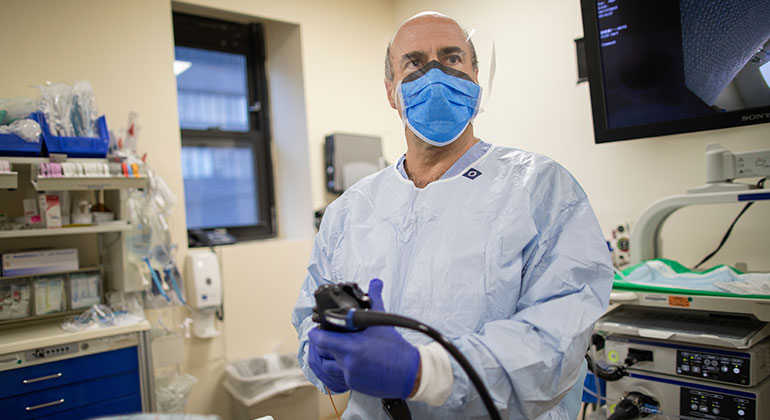Gastrointestinal Cancers

Gastrointestinal (GI) cancer is the uncontrolled growth of abnormal cells (cancer) in the digestive tract and other abdominal organs. There are several distinct types of GI cancers, including cancer of the esophagus, stomach, pancreas, small bowel, colon, rectum, and anus. Each cancer is different and requires special treatment. It’s important to get regular checkups and screening if you experience symptoms that concern you.
We have an extensive team of GI cancer experts at Mount Sinai. Our expertise spans a broad range of specialties, from gastroenterologists, endoscopists, radiologists, surgical oncologists, medical oncologists, radiation oncologists, interventional radiologists, nutritionists, and social workers. Our doctors collaborate to create a personalized treatment plan that is right for you. We are dedicated specialists focused on all types of GI cancer research, screening, prevention, treatment, and cures.
Symptoms of GI Cancer
Common symptoms of cancers that affect your digestive tract, do not necessarily indicate that you have cancer. It’s essential that you get a proper diagnosis and treatment, especially if you experience the following symptoms constantly over a period of time.
- Abdominal pain
- Fullness in the upper abdomen after eating a small meal
- Heartburn or indigestion
- Nausea
- Poor appetite
- Vomiting
- Weight loss that’s unexplained
Types of GI Cancer
Each part of the digestive tract may develop cancerous tissue that is unique to that part of your body, such as:
- Anal cancer: Signs include bleeding from the anus or rectum or a lump near the anus. This is a relatively uncommon type of cancer, treated with chemotherapy and radiation. One preventive measure is avoiding the HPV virus through safe sex practices and the HPV vaccine.
- Colorectal cancer: Signs include changes in bowel movements and blood in the stool. This form of cancer may start in the colon or the rectum. Regular screening for colon cancer, a colonoscopy, is widely recommended. Its purpose is early intervention and treatment.
- Esophageal cancer: Signs include difficulty swallowing and hoarseness. Considered a rare form of cancer, if you have Barrett’s esophagus, you will be monitored and screened for esophageal cancer, which is treated with surgery, chemotherapy, and radiation therapy.
- Gastric cancer: Signs include severe persistent heartburn and stomach pain. A high-fiber diet and other healthy habits can help prevent this cancer. Treatment may include surgery, radiation, and chemotherapy.
- Pancreatic cancer: Signs of pancreatic cancer depend on its type. Causes vary but may include smoking and obesity. Treatment is based on its type and stage.
- Small bowel cancer: Signs of this rare disease may include dark stool and severe diarrhea. Causes vary and Crohn’s disease may put you at risk. Treatment involves surgery, chemotherapy, and radiation therapy.